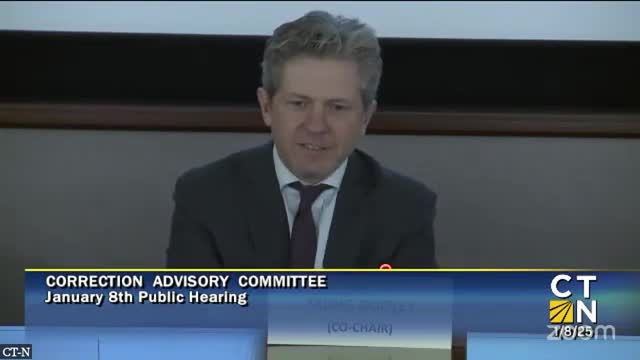Correction Advisory Committee ranks three finalists for Connecticut ombudsman, flags funding and staffing shortfalls
Get AI-powered insights, summaries, and transcripts
Subscribe
Summary
The committee selected a ranked list of three finalists for the permanent correction ombudsman position and agreed to transmit the list to the governor, while candidates and the interim office emphasized limited staff, unpaid caseloads and the need for a larger budget to handle systemic issues inside Department of Correction facilities.
At a public hearing of the Correction Advisory Committee in Connecticut, the panel ranked three finalists for the permanent correction ombudsman position and said it would transmit the list to the governor for final selection. The committee announced its ranking after an executive-session deliberation: No. 1 Devon Ward; No. 2 Keisha Ellis; No. 3 Dawn (Don) Poindexter. The committee did not provide a public vote tally when it announced the ranking.
The hearing focused less on making an immediate appointment than on candidates’ plans to stand up an office that committee members and public speakers said currently lacks sufficient staff and funding. Ty Guiley, co-chair of the Correction Advisory Committee, framed the panel’s legal duty: the committee’s statutory role is to recruit, vet and rank three candidates and present a ranked list to the governor.
Why it matters: the ombudsman’s office is intended to investigate complaints from people incarcerated in state facilities, identify systemic trends, and recommend changes to improve conditions, medical care and grievance processes. Candidates and the interim ombudsman described heavy caseloads, medical and mental-health staffing gaps, and procedural barriers that can delay or block remedies for people inside.
Devon Ward, the interim ombudsman and the committee’s top-ranked finalist, told the committee he has handled the office’s work single-handedly since September and has tracked nearly 250 individual claims to date. “I am a I’m a a 1 man shop and, the charge of the OZBUDs is representing 10,000, individuals who are incarcerated, another additional 2,000 who are paroled in in our communities,” Ward said during the hearing. He described prioritizing urgent medical complaints and safety issues while noting that more-resourced investigations — such as assaults that require review of video and multiple interviews — exceed his current capacity.
Ward outlined a hiring plan he has proposed in the governor’s budget request: two geographic districts modeled on DOC regions, each with an associate ombuds, an investigator, an office administrator and a staff attorney — about eight staff in total — plus an office-wide data/case-management system. He told the committee that his budget request is “a little bit shy of 2,000,000” and that the office today is operating without a formal case-management system, relying on an Excel spreadsheet. Ward said the office needs reliable channels inside prisons (secure phone lines and dedicated drop boxes) and staff who can visit facilities regularly to triage complaints.
Candidates’ priorities and backgrounds
- Dawn Poindexter, the third-ranked finalist, described community-based grievance work and group facilitation in York Correctional as the basis for her approach. “My name is Dawn Poindexter, and I’m honored to appear before you as a candidate for the Ombudsman position,” she said. Poindexter emphasized building trust through listening, mediation and starting “where they are at” when prioritizing remedies. She told the committee her fundraising experience is limited to private grants and community events and that she would pursue a staffing plan and funding strategy for the new office.
- Keisha Ellis, the committee’s second-ranked finalist, described long experience in corrections both as a Federal Bureau of Prisons counselor and later as a program manager for contracted halfway houses. She told the panel, “Justice is not just a concept. It’s a lived experience,” and said a priority would be a listening tour, a triage system for incoming complaints and a strategic plan to sustain staffing and services. Ellis described plans to prioritize vulnerable subpopulations, including women and people with mental-health needs, and to connect assessments inside DOC with continuing care after release.
Public comment: attendees and several community groups urged stronger staffing and statutory teeth for the office. Multiple public speakers, including Barbara Fair of Stop Solitary CT and representatives of BLM 860 and other justice-impacted organizations, urged the committee to choose an ombudsman with both the will and resources to investigate abuse and hold the department accountable. Several speakers explicitly endorsed Devon Ward; others called for immediate increases to the office’s budget and more operational authority.
Systemic concerns raised during the hearing
Ward and multiple committee members identified recurring issues in DOC facilities: gaps in medical staffing (including facilities without regular optometry or dental coverage), mental-health staffing shortages, inconsistent grievance outcomes and concerns about the security risk group (SRG) classification process, which can limit people’s phone privileges, contact visits and programming. Ward also said York Correctional — the state’s women’s prison — lacked a law library, a point he described as a legal-access concern.
Committee process and next steps
The Correction Advisory Committee moved into an executive session to deliberate the three finalists, and then announced the ranked list publicly. The transcript does not include a roll-call vote or tally for the ranking; the committee said it will transmit the ranked list to the governor for final selection. The committee and several public speakers stressed that funding levels will determine how much the ombudsman’s office can accomplish and urged the governor and legislature to increase resources beyond the office’s initial allocation.
Ending note: The committee’s action is a ranking and referral; the governor has statutory authority to choose any candidate from the submitted list. The committee and public commenters emphasized that the office’s ability to investigate systemic problems, reduce litigation by resolving cases administratively, and support people who are incarcerated depends on whether the legislature and the governor provide the staffing and systems the new office requests.
